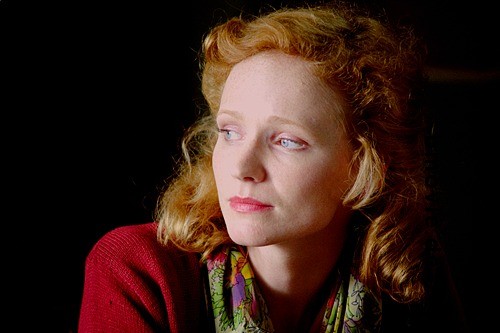Ana Geislerova stars at Eliska in "Želery.”
“Želery” is one of those films that makes me wish it were holographic. The scenery is so beautiful and the music is so moving that I want to be surrounded by it. This movie is best viewed on a big screen, with excellent sound. If I could have smelled the herbs, flowers and berry fields, the clean mountain air, the chimney smoke and even the animals; if I could have experienced it with all my other senses, I would have been even happier.
It is the story of Eliska (Ana Geislerova), a medical student in Prague during World War II. The Czechs were suffering under the hand of Reinhard Heydrich, Protectorate of Bohemia and Moravia, and architect of the Holocaust. She meets Joza (Gyorgy Cserhalmi) by chance one night at the hospital while there with her lover, who is his surgeon. Eliska and the surgeon work with the resistance, an underground network trying to save lives from Heydrich’s cruelties. When the network is exposed, she is sent alone to the country among rural folk to hide. As she adapts from city to country life and grapples with the risk she brings to the village, a romance quietly grows.
The story is set in Moravia, in the Wallachia region of the Czech Republic. This area, which includes the cities of Olomouc and Ostrava, is the ancestral home of the majority of Texas Czechs. It is in the Beskydy Mountains, foothills of the Carpathians. The mountains are old and rounded, lush and green - similar to the Smokies here in the U.S. If you have visited there, you understand.
The 2003 film, directed by Ondrej Trojan was nominated for the 2004 Academy Award as Best Foreign Language Film. The story is adapted from two works by Czech novelist Kveta Legatova, “Želery” and “Jozova Hanule.” Although Ms. Legatova, whose life spanned from 1919 to 2012, only found fame late in life, “Želery” was a literary sensation when it hit the bookstores only a few years before the film was made. In a 2004 interview with Radio Prague, Ms. Legatova spoke of her work.
“Želery” was written thirty or forty years ago - the basic stories - though, I had to make changes. But Jozova Hanule was written now - in the 1990s, when I was already in my 80s. I decided to write Hanule based on a competition put forward by the Milos Havel Fund, promoting the writing of film scripts. I thought 'Should I apply?' Then I took a story from Zelary - the end of World War II - and expanded it into the new book."
Kveta Legatova, author of "Želery.”
Ms. Legatova was born in Podolí u Brna, a village just outside of Brno, also in Moravia and a few hours north of Vienna, Austria. But, she taught school in the Wallachia, and her characters are studies of people she knew there.
"The characters there have very sharp contours, (a feature) which elsewhere is not so well-defined - or doesn't come to a head." She spoke about her love for writing. "If I were to talk till midnight about the gallery of potential characters and you were able to choose from among your colleagues, your students, your neighbors, you would uncover one story after another. It interests me so much. If I could only write it all! If one didn't have to do anything else ..."
The Czech Heritage Museum is screening “Želery” on July 10 starting at 7 p.m. at The Beltonian Theatre, 219 E. Central Ave., Belton, Texas. Admission is free. Rated R (nudity, violence, adult themes). Czech audio with English subtitles.
Here is the trailer in English:
““Mr. Cserhalmi, burly and soft-spoken and Ms. Geislerova are both subtle, serious actors, and they handle the relationship between their characters with patience and precision. Mr. Trojan is similarly patient, allowing the story to ripen and evolve according to the seasonal rhythms of the countryside rather than marching it from one incident to the next. His camera wanders around the rugged, beautiful landscape, across the mountainsides, and through the forests, as Zelary’s human tableau comes quietly to life.” ”


